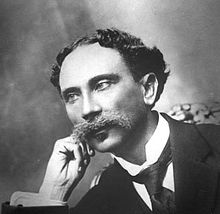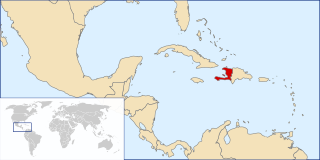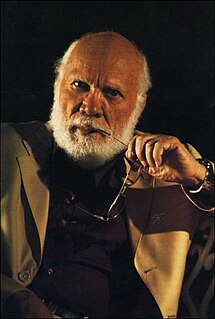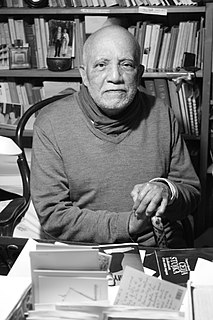
Etzer Vilaire (7 April 1872 - 1951) was a Haitian poet and attorney.

Etzer Vilaire (7 April 1872 - 1951) was a Haitian poet and attorney.
Born in Jérémie, Vilaire was educated in private schools. He attended law school and passed the bar.
Entering a law practice, he wrote poetry in his spare time but it was his true vocation.
He was a member of the literary society La Ronde.
He published several books of poetry. His most remembered works are Page d'Amour (1897), Dix Hommes Noirs (1901), Années Tendres (1907), and Nouveaux Poèmes (1910).

The Dominican Republic is a country located on the island of Hispaniola in the Greater Antilles archipelago of the Caribbean region. It occupies the eastern five-eighths of the island, which it shares with Haiti, making Hispaniola one of only two Caribbean islands, along with Saint Martin, that is shared by two sovereign states. The Dominican Republic is the second-largest nation in the Antilles by area at 48,671 square kilometers (18,792 sq mi), and third-largest by population, with approximately 10.8 million people, of whom approximately 3.3 million live in the metropolitan area of Santo Domingo, the capital city. The official language of the country is Spanish.

Haiti, officially the Republic of Haiti, and formerly known as Hayti, is a country located on the island of Hispaniola in the Greater Antilles archipelago of the Caribbean Sea, to the east of Cuba and Jamaica and south of The Bahamas and the Turks and Caicos Islands. It occupies the western three-eighths of the island which it shares with the Dominican Republic. To its south-west lies the small Navassa Island, which is claimed by Haiti but is disputed as a United States territory under federal administration. Haiti is 27,750 km2 (10,714 sq mi) in size, the third largest country in the Caribbean by area, and has an estimated population of 11.4 million, making it the most populous country in the Caribbean. The capital is Port-au-Prince.

André Robert Breton was a French writer and poet. He is known best as the co-founder, leader, and principal theorist of surrealism. His writings include the first Surrealist Manifesto of 1924, in which he defined surrealism as "pure psychic automatism".

François Duvalier, also known as Papa Doc, was a Haitian politician who served as the President of Haiti from 1957 to 1971. He was elected president in the 1957 general election on a populist and black nationalist platform. After thwarting a military coup d'état in 1958, his regime rapidly became more autocratic and despotic. An undercover government death squad, the Tonton Macoute, indiscriminately killed Duvalier's opponents; the Tonton Macoute was thought to be so pervasive that Haitians became highly fearful of expressing any form of dissent, even in private. Duvalier further sought to solidify his rule by incorporating elements of Haitian mythology into a personality cult.

James Weldon Johnson was an American writer and civil rights activist. He was married to civil rights activist Grace Nail Johnson. Johnson was a leader of the National Association for the Advancement of Colored People (NAACP), where he started working in 1917. In 1920, he was the first African American to be chosen as executive secretary of the organization, effectively the operating officer. He served in that position from 1920 to 1930. Johnson established his reputation as a writer, and was known during the Harlem Renaissance for his poems, novel, and anthologies collecting both poems and spirituals of black culture. He wrote the lyrics for "Lift Every Voice and Sing", which later became known as the Negro National Anthem, the music being written by his younger brother, composer J. Rosamond Johnson.

Haitian Creole, commonly referred to as simply Creole, or Kreyòl in the Creole language, is a French-based creole language spoken by 10–12 million people worldwide, and is one of the two official languages of Haiti, where it is the native language of a majority of the population.

Frankétienne is a Haitian writer, poet, playwright, painter, musician, activist and intellectual. He is recognized as one of Haiti's leading writers and playwrights of both French and Haitian Creole, and is "known as the father of Haitian letters". As a painter, he is known for his colorful abstract works, often emphasizing the colors blue and red. He was a candidate for the Nobel Prize in Literature in 2009, made a Commander of the Ordre des Arts et Lettres, and was named UNESCO Artist for Peace in 2010.

Jacques Roumain was a Haitian writer, politician, and advocate of Marxism. He is considered one of the most prominent figures in Haitian literature. The African-American poet, Langston Hughes, translated some of Roumain's works, including Gouverneurs de la Rosée.

Jérémie is a commune and capital city of the Grand'Anse department in Haiti. It had a population of about 31,000 at the 2003 census. It is relatively isolated from the rest of the country. The Grande-Anse River flows near the city.

Félix Morisseau-Leroy, was a Haitian writer who used Haitian Creole to write poetry and plays, the first significant writer to do so. By 1961 he succeeded in having Creole recognized as an official language of Haiti, after expanding its teaching in schools and use in creative literature. Morisseau also published works on French, Haitian Creole and Haitian French literature. He worked internationally, encouraging the development of national literature in post-colonial Ghana and Senegal. In 1981 he settled in Miami, Florida, where he was influential in uniting the Haitian community around Creole and encouraged its study in academia.

Oswald Durand was a Haitian poet and politician, said to be "to Haiti what Shakespeare is to England, and Dante to Italy." He was also a Haitian writer and poet of French and Creole expression, considered as the national poet of Haiti. Besides he was also judged as a Romantic poet and the most prolific one in the nineteen centuries. These 20th-century successors such as René Depestre, and Jacques Roumain congratulated Oswald Durand for his authentic expressions and honored him as a forerunner of Haitian indigenism. He was born in the northern part of Haiti, in the city of Saint-Louis du Nord. In 1842, both his parents died in the earthquake that devastated the city of Cape Haitian. Oswald Durand, and his sister, were welcomed in their maternal grandmother who raised them. He spent most of his childhood outside the city where he was born. Because of political instabilities in Haiti, he was forced to leave school and to educate himself without having recourse to a teacher.
Justin Lhérisson was a Haitian writer, lawyer, journalist, and teacher. He is best known for two novels, La Famille des Pititecaille (1905) and Zoune Chez sa Ninnaine (1906), and for being the author of the lyrics of Haiti's national anthem, La Dessalinienne.

Georges Sylvain (1866–1925) was a Haitian poet, lawyer and diplomat. Born in Puerto Plata, Dominican Republic, Sylvain studied in his native city before attending school in Paris and receiving a law degree. After returning to Haiti, he founded a law school and two periodicals, La Patrie and, in 1922, l'Union Patriotique. He was a member of the literary society La Ronde and was involved in other literary activities. He published Confidences et Mélancolies (1901), a compilation of twenty-nine poems.
Jean-Fernand Brierre was a Haitian poet, dramatist, journalist, and diplomat. He is recognized "as one of the most brilliant Haitian writers," and has produced a significant body of poetry to his credit. He also served as Haiti's ambassador to Argentina.
Roussan Camille was a Haitian poet, journalist, and diplomat.

René Depestre is a Haitian poet and former communist activist. He is considered to be one of the most prominent figures in Haitian literature. He lived in Cuba as an exile from the Duvalier regime for many years and was a founder of the Casa de las Américas publishing house. He is best known for his poetry.
Indran Amirthanayagam is a Sri Lankan-American poet-diplomat, essayist and translator in English, Spanish, French, Portuguese and Haitian Creole.
Haitian literature has been closely intertwined with the political life of Haiti. Haitian intellectuals turned successively or simultaneously to African traditions, France, Latin America, the UK, and the United States. At the same time, Haitian history has always been a rich source of inspiration for literature, with its heroes, its upheavals, its cruelties and its rites.

The historiography of Haitian cinema is very limited. It consists only one double issue of the journal of the French Institute of Haiti Conjonction, released in 1983, devoted to film; a book by Arnold Antonin, published during the same year, entitled Matériel pour une préhistoire du cinéma haïtien ; and an article by the same author in the 1981 book Cinéma de l’Amérique latine by Guy Hennebel and Alfonso Gumucio Dagrón.

Petit Séminaire Collège Saint-Martial, is an all-boys Catholic school located in Port-au-Prince, the capital of Haiti. The school is under the control of the Holy Ghost Fathers.